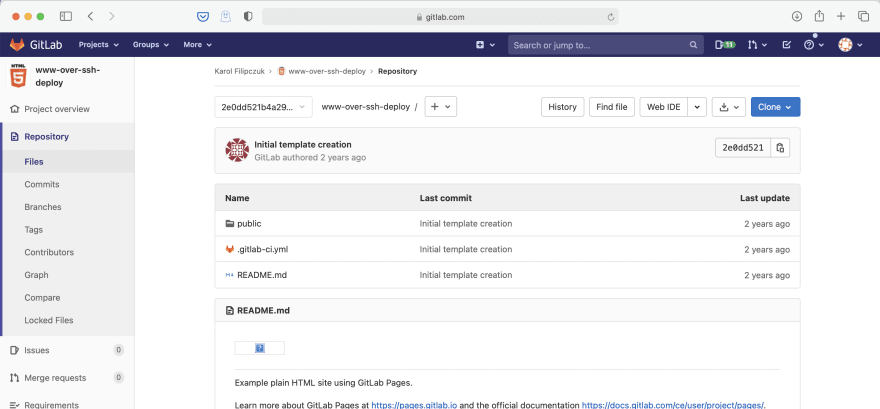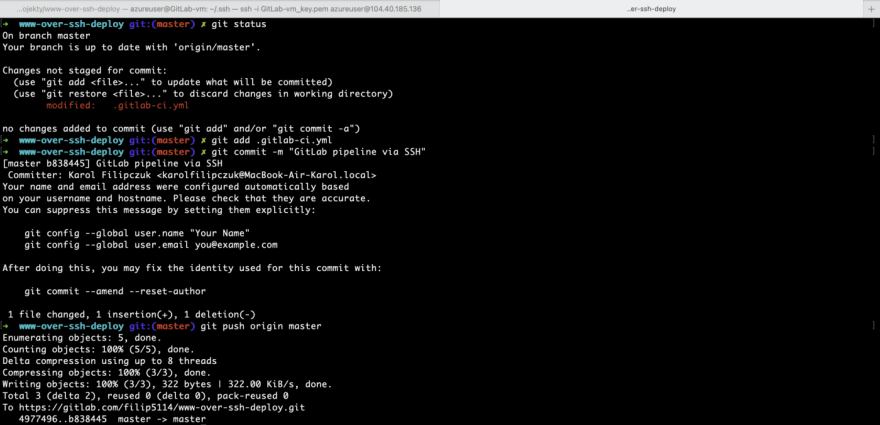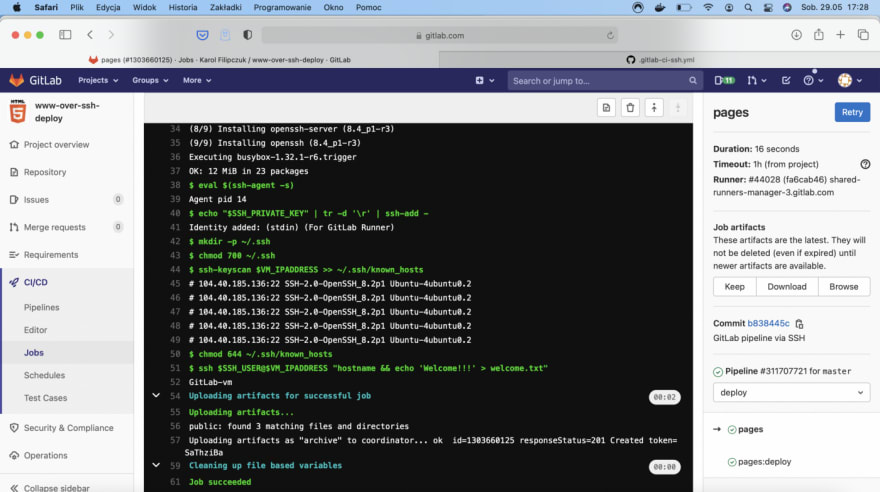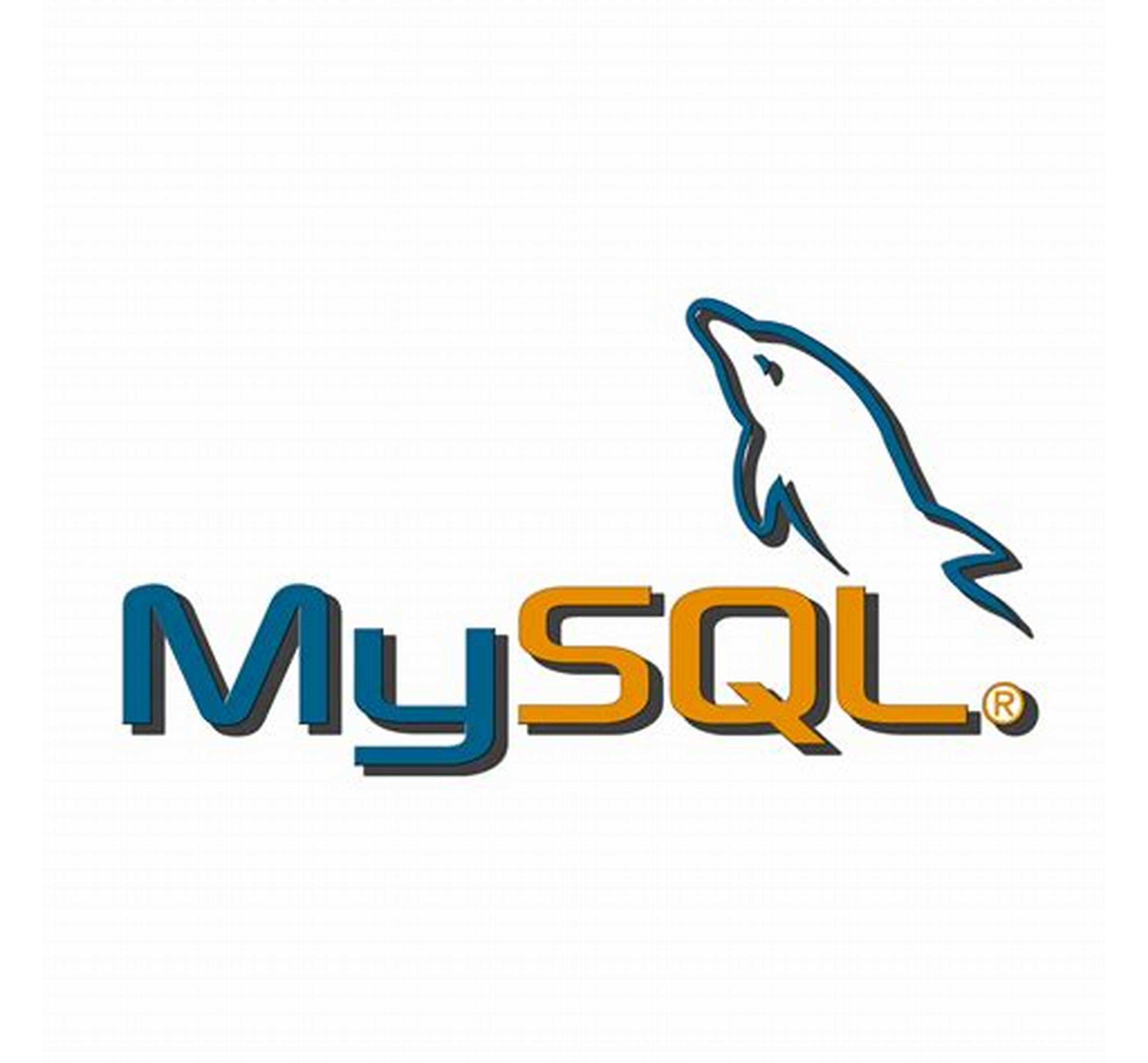When you think about deploying to remote server, SSH is first network protocol which comes to your mind. Adding on top GitLab CI/CD will let you take advantage of automation. To use GitLab CI/CD pipeline together with SSH connections it is necessary to firstly configure GitLab and I would like to show you how to configure it and run simple script.
Prerequisite
- GitLab account
- Remote server (I’m using Azure’s Linux VM)
Agenda
- Create new GitLab project
- Create and add SSH keys
- Create and run GitLab CI/CD pipeline
Create new GitLab project
As a first step we will create GitLab project.
Login into GitLab and navigate to New project -> Create from template -> Pages/Plain HTML -> Use template. Give it a project name and hit Create project. This will create a simple plain html project.

The template created README.md file, initial .gitlab-ci.yml and public directory with index.html and style.css files.
Create and add SSH keys
We already have an example project, now we need to create SSH keys. They will be used to connect to our remote server. Each time GitLab CI/CD pipeline is running, it is using GitLab Runner.
GitLab Runner is an application which task is to run jobs in GitLab CI/CD pipeline. GitLab Runner can be installed by yourself on your infrastructure or you can leverage Shared Runners maintained by GitLab. You have 400 minutes per month for free from GitLab. We will use Shared Runner, since they are rady to use out-of-the-box and there is no configuration needed for our example. We need to setup SSH keys in a way that job run by Shared Runner will be able to access our remote server over SSH connection.
Create SSH key
You can create new SSH key in any environment, even your local environment. When you create new SSH key, you will receive two keys: private and public. It is important that GitLab have private key and your remote server has public key. That is why it doesn’t matter where you create keys, it only matters to share them accordingly with GitLab and remote server.
I have linux virtual machine on Azure and will use it for the purpose of this post. I’ll create new ssh key using the VM. GitLab recommendation is to create SSH key type ED25519, which is more secure than RSA. To create new key run ssh-keygen -t ed25519 -C "GitLab SSH key". Text after -C option is a comment and you can change it.

The key will be created in default directory which for linux is /home/<user>/.ssh. Do not specify passphrase, otherwise it will be cumbersome for GitLab CI/CD pipeline. You should have two new files in .ssh directory:
id_ed25519— private keyid_ed25519.pub— public key
Add private key as GitLab Variable
Copy content of private key and go back to GitLab project. Navigate to Settings -> CI/CD -> Variables -> Expand -> Add Variable. GitLab’s variable is a key-value pair. Name key SSH_PRIVATE_KEY and paste private key in value field. Click Add Variable.
Add two more variables:
SSH_USER— name of the user on the remote serverVM_IPADDRESS— IP address of remote server

Add public key to remote server
Copy content of public key and go back to remote server. Login as the same user which you have specified in SSH_USER GitLab’s variable. If you don’t have yet this user, it is time to create it.
Navigate to /home/<username>/.ssh. If directory .ssh doesn’t exist, then create it. Paste the public key into authorized_keys file. If you don’t have authorized_keys file, create it. Here is screenshot from my VM (which I have deleted before posting, so they are useless now).

Create and run GitLab CI/CD pipeline
It’s time to create GitLab CI/CD pipeline. We want to achieve two goals using SSH: log remote server’s hostname and create an example file in user’s home directory.
The pipeline is defined in .gitlab-ci.yml and we have two option to create/edit:
- Directly in GitLab project in web browser, we can edit
.gitlab-ci.ymland commit changes - Clone repository, edit
.gitlab-ci.ymlin your favorite code editor, commit changes and push it to GitLab
I will go with option number 2, it’s more proper way to handle .gitlab-ci.yml.
You can clone repository using command git clone <repo_address> and repo address you can find in GitLab repository by clicking Clone button.
After cloning open already existing .gitlab-ci.yml which was created as part of the Pages/Plain HTML template.
Original .gitlab-ci.yml:
image: alpine:latest
pages:
stage: deploy
script:
- echo 'Nothing to do...'
artifacts:
paths:
- public
only:
- master
We need to add before_script section and update script section.
Final .gitlab-ci.yml:
image: alpine:latest
pages:
stage: deploy
before_script:
- 'command -v ssh-agent >/dev/null || ( apk add --update openssh )'
- eval $(ssh-agent -s)
- echo "$SSH_PRIVATE_KEY" | tr -d '\r' | ssh-add -
- mkdir -p ~/.ssh
- chmod 700 ~/.ssh
- ssh-keyscan $VM_IPADDRESS >> ~/.ssh/known_hosts
- chmod 644 ~/.ssh/known_hosts
script:
- ssh $SSH_USER@$VM_IPADDRESS "hostname && echo 'Welcome!!!' > welcome.txt"
artifacts:
paths:
- public
only:
- master
.gitlab-ci.yml defines pipeline. It uses docker image alpine:latest to run jobs defined in pipeline. We only have one job pages.
The job run in stage: deploy. We didn’t define any stages, but we have 5 default stages to use: .pre, build, test, deploy, .post. It doesn't matter in our case, since our pipeline at the moment is simple and doesn’t require setting up stages.
Then we have before_script which is pretty self-explanatory and will run before script command. Let’s explain script line by line:
command -v ssh-agent > /dev/null || (apk add --update openssh)— checks if ssh-agent is already installed and if not, then install iteval $(ssh-agent -v)— starts ssh-agentecho "$SSH_PRIVATE_KEY" | tr -d '\r' | ssh-add —— adds ssh private key stored in variableSSH_PRIAVTE_KEYto agent storemkdir -p ~/.sshandchmod 700 ~/.ssh— creates.sshdirectory and assign correct permissionsssh-keyscan $VM_IPADDRESS >> ~/.ssh/known_hosts— checks public key on remotes server using IP address stored inVM_IPADDRESSvariable and add it to known hosts. It is protecting from men-in-the-middle attack and is necessary to work, otherwise the job will fail.chmod 644 ~/.ssh/known_hosts— assign correct permissions- For more information refer to GitLab docs here
script is where our actual code to execute is defined. We simply want to print hostname to job log and then create an example file on remote host.ssh $SSH_USER@$IP_ADDRESS "hostname && echo 'Welcome!!!' > welcome.txt" will connect over SSH as user specified in SSH_USER variable to remote server, then run command hostname which will print hostname and echo Welcome!!! to file welcome.txt which will be created on remote server in SSH_USER home directory.
artifacts specify which artifacts to use in deployment. We are not using it in our example.
only specify that the job should be only run if any change is pushed into master branch in repository.
After making changes, we need to commit them and push to repository.

Once the change is pushed into master branch the GitLab CI/CD will be trigged. Navigate to CI/CD -> Pipelines and you should see pipeline in status running.

Click on it and the click on job pages to see logs.

Job should finish quickly, in my case it took 16 seconds. The last line shows that job was run successfully. Line 51 shows script part from .gitlab-ci.yml and in line 52 we can see remote server hostname which is exactly what we wanted to achieve. Check your remote server, you will find welcome.txt there.
That’s it! We have successfully created new GitLab project, setup SSH connection to remote server and created simple GitLab CI/CD pipeline to run script via SSH to the remote server.
Thanks for reading.






 已为社区贡献22912条内容
已为社区贡献22912条内容

所有评论(0)